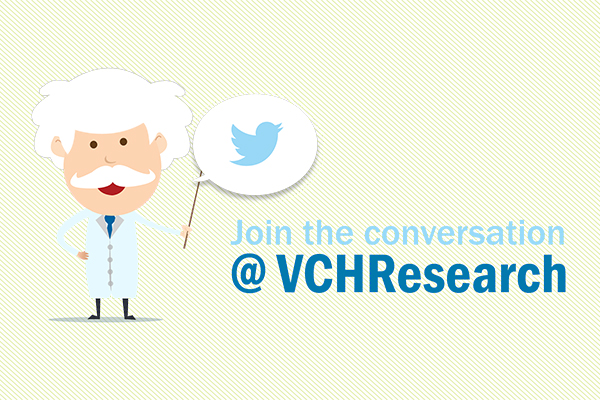
Strong research presence on social media a benefit to health information-seeking public.
VCH Research Institute research team CREST.BD (the Collaborative RESearch Team to study psychosocial issues in Bipolar Disorder) has experienced firsthand the benefits of using social media to share their research and knowledge about the mental health condition. CREST.BD started Tweeting in August 2011 and as of August 2014, Twitonomy estimated that their Twitter activities have a potential reach of more than 1.9 million Twitter users, and followers of @CREST_BD have more than doubled in the past 12 months.

“Twitter has allowed for rapid dissemination of our bipolar disorder research findings and helped us keep abreast of – and helped us shape - community and scientific dialogue on mental health issues,” says Dr. Erin Michalak, CREST.BD lead, Director for mental health research in the VCHRI Coastal CeNtre for CommuNity BasEd and CollaboraTive (CONNECT) group and Associate Professor in the Department of Psychiatry at UBC.
“The continuous growth of our Twitter profile is responsible for creating linkages with stakeholders across Canada and internationally and driving traffic to the evidence-based content produced by CREST.BD research.” – Dr. Michalak
The team’s use of various web technologies such as its website (www.crestbd.ca), webinars, social media and file-sharing platforms has increased the impact and reach of their work. Online resources such as YouTube, Slideshare, Facebook and the website have all yielded results, but it is Twitter that has proven to be one of the most important open communications channels that they have implemented.
Twitter outperforms other social media platforms
Twitter is fast becoming the research tool of choice. According to a recent article in Nature, while only 13% of researchers worldwide reported being active on Twitter – far fewer than those active on Google Scholar, ResearchGate and LinkedIn – those on the platform found it to be more beneficial to follow discussions on research-related issues.

Dr. Michalak sees other benefits too. “At CREST.BD, we use Twitter in a number of ways, such as fighting the stigma associated with bipolar disorder, supporting self-management and impacting healthcare practices. We can deal with the problem of misinformation about bipolar disorder by addressing it directly, thereby decreasing the barriers to health literacy,” she says.
CREST.BD engages in dialogue and creates relationships with people with lived experience, academics, decision-makers, professional healthcare associations, and community-based organizations, not to mention that it enables rapid and targeted sharing of key research findings to a large number of potential end-users. For example, Tweetchat events provide a live, digital platform for knowledge exchange among these target audiences in a cost-effective and high-impact manner. CREST.BD’s World Bipolar Day Tweetchat generated dialogue on self-management in bipolar disorder, and shared learnings from the team’s ongoing self-management research. This year, on September 10th (World Suicide Prevention Day) at 5:00pm PDT, the team is co-hosting a #mhsm (mental health and social media) Tweetchat with peer-led @UnSuicide. The purpose is to facilitate dialogue on experiences of suicidality with BD, share and generate new knowledge about resiliency skills, and address stigma, while providing discussion points on suicide risks unique to bipolar.
“Twitter has allowed for rapid dissemination of our bipolar disorder research findings and helped us keep abreast of – and helped us shape - community and scientific dialogue on mental health issues.” – Dr. Michalak
Social media outreach can also enhance recruitment of research participants, particularly from targeted populations. Health researchers are not the only people benefitting from being active on Twitter and other social media. People facing health challenges in B.C. and their family members, as health consumers, reap the rewards of a strong research presence.
“As people turn to online resources for information related to their health, researcher participation can ensure that evidence-based research outcomes are being made swiftly available to the general public, health media, and healthcare practitioners,” adds Dr. Michalak. “The sooner information is disseminated, the sooner its results can be put into practice.”
Follow Dr. Michalak on Twitter at @CREST_BD and @erin_michalak.



